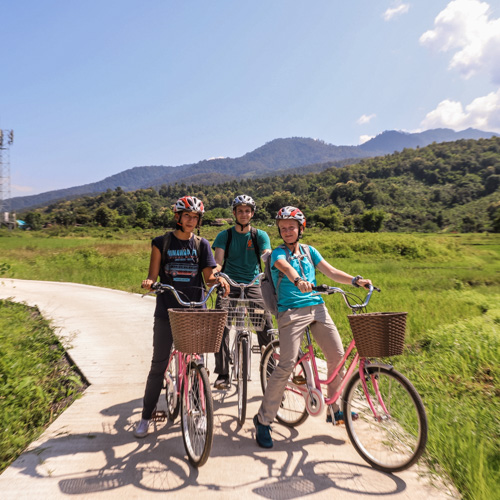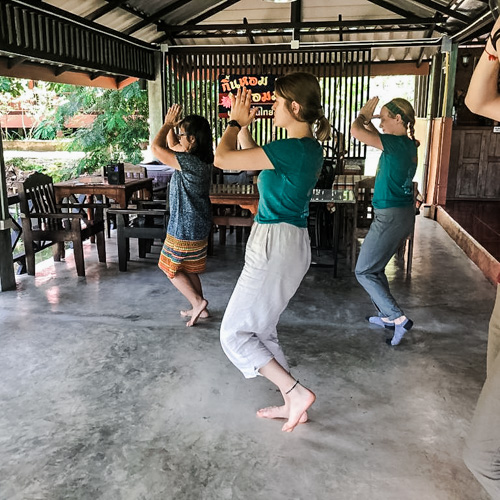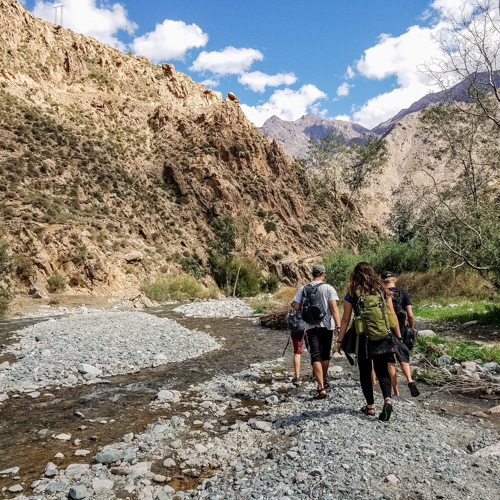


Carpe Diem Health & Safety
Our students’ health and well-being is one of our highest priorities.
We do our utmost to support student health and safety in the following ways:
Smart Traveler Enrollment Program (STEP)
We ensure that every student is enrolled in the US State Department Smart Traveler Enrollment Program (STEP), which provides the latest updates and information pertinent to the places the students are traveling, including travel warnings and alerts. This service is organized by consular officers around the world and is a valuable resource in terms of information and added support.
Highly Skilled Overseas Educators (OEs)
Our Overseas Educators have extensive travel and leadership experience and hold current Wilderness First Aid certifications. If a student requires a doctor visit, a leader will accompany him/her/them to make sure he/she/they ask all the relevant questions and gets the best medical care possible. Our program leaders are also highly skilled and prepared to make critical medical and evacuation decisions in remote locations.
Bi-Annual Safety Reviews
Our Program Directors stay current in world and regional events through various news sources, including reports from the Overseas Safety Advisory Council (OSAC). Twice per year, our Program Directors do a thorough review of safety reports and make recommendations and adjustments to itineraries as needed.
In-Country Contacts
Carpe Diem has built a vast network of in-country partnerships. Often leaders in their respective communities, these contacts have the most current information with regards to matters of health and security. From the process of planning itineraries, to on-the-ground support, our partners provide guidance in accordance with their local expertise and knowledge. If ever deemed necessary, CDE will adjust itineraries to avoid any unsafe areas.
Student Education and Training
The students, of course, also play a central role in maintaining their own health and well-being. During orientation at the beginning of the group semester, OEs will conduct several workshops for students around health and safety matters to equip students with the information they need. OEs will also ensure students understand Carpe Diem’s policies, which are designed to best promote students’ health and well-being. It is also vital that students communicate openly and honestly with OEs regarding any health needs and conditions, both at the beginning of the semester and throughout the semester. Latitudes Year students are required to be certified in first aid prior to departure for their Focused Volunteer Placement (FVP).
iNext Travel Insurance
All students are enrolled in iNEXT insurance, which enables access to medical assistance 24-hours per day, 7 days a week. These health professionals provide consultations in case of medical emergencies, and can access a vast database that includes information about local hospitals, nearest available care, and concerns specific to the region.
Gap Year Association (GYA) Accreditation
The Gap Year Association (GYA) is a nonprofit accreditation and standards-setting organization for Gap Years and is recognized as such by the US Department of Justice and the Federal Trade Commission. GYA objectively runs organizations through a rigorous set of 125 standards in order to ensure the highest caliber in safety, quality, and integrity. As one of the first organizations to be accredited by the GYA in 2014, Carpe Diem Education continues to spearhead industry-wide best practices in field leadership, safety standards, and organizational integrity.


Emergency Response and Risk Management
Since 2007, Carpe Diem Education has successfully facilitated international education experiences for over 120 groups and 1500 students. With an excellent track record for safety and risk management, you can be confident that we will provide an authentic, off-the-beaten-path experience using best industry practices to effectively navigate the complexities of international travel.
Carpe Diem Education has developed risk management policies and procedures which allow us to respond as quickly—and skillfully—as possible to on-the-ground emergencies. Our Portland HQ staff is on call 24/7 for the duration of the program.
Critical Incident Response
We have extensive policies and procedures in place for critical incident stress debriefings and psychological first aid in the event that a traumatic event occurs.
Licensed Consultation with Professionals
Carpe Diem Education has a partnership with a licensed medical doctor who is available to our staff for consultation regarding treatment plans and medication. This additional level of oversight and support ensures we are pursuing the best treatment plan for your students, should they need medical attention.
We also have a partnership with a mental health specialist who serves as an independent consultant for any program participant experiencing a mental health issue. The specialist conducts an over-the-phone consult to assess the status of the student and provides initial emergency counsel when necessary.
Staying Informed
In order to be aware of and sensitive to natural disasters, political unrest, and large scale emergencies, Regional Program Directors check international news sources, Global Incident Map, Reliefweb and State Department websites and receive daily reports from the Overseas Security Advisory Council. They regularly communicate with local partners and contacts to get up-to-date, on the ground information
Carpe Diem's Student Emergency Fund
Included in the program fee is a $100 medical emergency fund for each student. This money is distributed by program leaders as needed for medically related issues. In the event that this medical fund is used up, we will contact parents with a request that it be replenished.


Health & Safety FAQ
Do I need international travel insurance?
Carpe Diem provides each student with travel insurance through our partnership with iNext Travel Insurance. Through iNext, we have 24-hour access to a team of U.S. doctors who provide consultation when medical situations arise. Providing each of our students with travel insurance through iNext also enables Carpe Diem to facilitate a uniform emergency response.
Note: Semester students receive the "Basic" plan through iNext; Latitudes Year students are enrolled in their "Premium" Plan.
Which immunizations should I get?
Carpe Diem encourages students and parents to consult the Centers for Disease Control (CDC) website (https://www.cdc.gov/) to see the latest updates on vaccination recommendations specific to the countries in which students will be traveling. We also recommend consulting a travel doctor, as they will be able to answer specific questions that you may have regarding immunizations and malaria prophylaxis.
Vaccination and immunization costs vary widely. We recommend that you shop around. Most health insurance plans won't cover nontraditional or travel-related vaccinations, so expect to pay full price on some of these. State Travel Health and Immunization Clinics, found in larger cities, tend to have the lowest costs.
Each year we have a few students who opt out of these vaccinations and choose to work with a naturopath or alternative specialist. If you don't want to take any of the recommended vaccinations, you will still need to sign and return the Insurance & Immunization form during the application process.
The CDC Recommends the Following Vaccinations for All Carpe Diem Program Locations:
- Booster for Tetanus-diphtheria: Even if you should have been vaccinated as a child, make sure you check with your family physician and get the necessary boosters. This booster needs to be taken at least two weeks before travel.
- MMR: This is an adult booster for Measles, Mumps, and Rubella; these three boosters are given together. This is not recommended for anyone who is pregnant or planning to become so within a year of receiving the booster.
- Typhoid: Typhoid is a water-borne disease, and one of the most prolific causes of traveler's diarrhea. A single injectable vaccination is good for 2 years, while oral Typhoid tablets are good for five years. You must complete the shot or last tablet at least two weeks prior to travel. The oral vaccine tends to be less expensive, but requires refrigeration and accurate timing of doses in order to maximize its effectiveness.
- Hepatitis A: Hepatitis A is a food-borne illness that affects many travelers. A single vaccination is good for one year with 80% immunity, and increased immunity is gained with a follow-up booster within six-12 months after the first shot.
- Hepatitis B: This vaccination is a series of shots given over nine months' time to completion. Hepatitis B is a blood-borne pathogen that is more virulent in its transmission than HIV, so for that reason most schools are now requiring the series for attendance. If you might be exposed to blood, have sexual contact with the local population, stay longer than six months, or plan on being a healthcare worker in the future, Hep B vaccination is a good idea. Again, speak with your healthcare provider and travel physician.
- Malaria: Malaria is a preventable disease that can be fatal if left untreated. There is not currently a vaccination for malaria. Carpe Diem requires that you consult a travel physician about the appropriate malaria prophylaxis needed for the semester as it varies by region and is not recommended for all regions that Carpe Diem travels to. There are three main drug regimens available: Mefloquine, Malarone, & Doxycycline. Mefloquine [Larium] can have several emotional/psychological side effects; Doxycycline [an antibiotic] causes sun sensitivity and can potentially contribute to antibiotic resistance; Malarone is the broadest-spectrum drug available on the market, but is by far the most expensive. Be aware of potential side effects and discuss with your healthcare provider which one is the best choice for you. Malaria is NOT a concern for the Fiji/New Zealand/Australia semester.
- Yellow Fever: Yellow Fever is a serious mosquito-borne illness, so serious that some countries require proof of vaccination on entry and exit. There is a special region on the World Health Organization [WHO] card that your travel clinic will use to document all of your immunizations for this vaccination, and it's a good idea to make scan a copy of this card and email it to yourself for backup.
Optional Immunizations
- Polio Vaccination
- Rabies vaccination: This is a vaccination that is given before exposure and is an extensive series of injections that do not necessarily make post-exposure injections unnecessary, but may reduce the number of post-exposure injections needed should a bite from a questionable animal occur. Carpe Diem does not recommend this series because it is very expensive, our groups will not be intentionally or overly exposed to wild/potentially rabid animals, and the series doesn't prevent rabies, it just makes the post-exposure series potentially shorter.
- Japanese Encephalitis: This disease is a potentially lethal, though rare, disease that consists of a series of 3 vaccinations. You may read about Japanese Encephalitis on the CDC site and decide whether you want this optional immunization.


What are prescription medication policies?
It is important that you notify your program directors and leaders of ANY medications you are taking regularly. While overseas, you are responsible for your own regulation, storage, and administration of your medications. Carpe Diem requests that you bring enough prescription meds to last the duration of your semester, as it can be very difficult and often inconvenient to re-supply in many of the places we travel. Please consult your physician and a travel doctor in regards to specific questions around taking your prescription medications while abroad.
Epi Pens: If you have any history of anaphylactic reaction(s), please consult your healthcare provider and follow their advice. If you have a history of anaphylaxis, we require that students bring three epinephrine pens: one for you to carry at all times, another for the OEs to carry in their medical kit, and another to remain in your bag for backup purposes.
Inhalers: If you have any history of asthma, we consult with your health provider to determine your needs during the semester.
